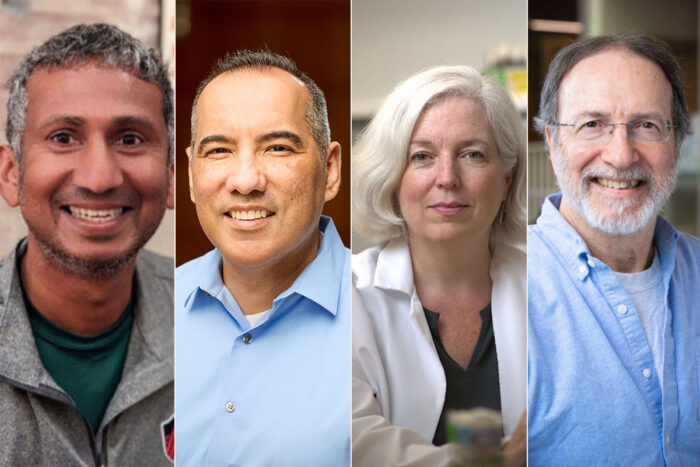Seven Washington University faculty elected to AAAS
Four of the newly named fellows are WashU Medicine faculty

WashU Medicine faculty elected to AAAS include (from left): Gaya Amarasinghe, PhD; Benjamin Garcia, PhD; Helen McNeill, PhD; and Tim Schedl, PhD.
Seven faculty members at Washington University in St. Louis are among the 471 new fellows selected by the American Association for the Advancement of Science (AAAS), one of the most distinct honors in the scientific community. Four of those seven are Washington University School of Medicine faculty.
The newly selected fellows from WashU Medicine are: Gaya Amarasinghe, PhD; Benjamin Garcia, PhD; Helen McNeill, PhD; and Tim Schedl, PhD. The others, on the Danforth Campus, are Kathryn Miller, PhD; Yehuda Ben-Shahar, PhD; and Young-Shin Jun, PhD.
AAAS is the world’s largest general scientific society and publisher of the Science family of journals. New Fellows will be celebrated June 7 at a forum in Washington, D.C.
Here are details on WashU Medicine’s four new fellows:
Gaya K. Amarasinghe
Amarasinghe, the Alumni Endowed Professor of Pathology and Immunology and a professor of biochemistry and molecular biophysics and of molecular microbiology at WashU Medicine, is being honored for distinguished contributions to the field of host-pathogen interactions.
Once they locate and invade their hosts, pathogens — which can be viruses, bacteria, fungi or parasites — co-opt the host’s molecular machinery to reproduce, spreading throughout the body. Understanding the complexities of the interactions between host and pathogen, especially how invaders tamp down host immune responses, is central to combating infection and subsequent illness. Amarasinghe and his colleagues probe the molecular dynamics of host-pathogen interactions using biochemical and biophysical methods to model causative agents of a variety of diseases, including viruses such as Ebola virus and Rift Valley Fever virus as well as Staphylococcus aureus.
Amarasinghe joined WashU Medicine in 2011.
Benjamin A. Garcia
Garcia, the Raymond H. Wittcoff Distinguished Professor and head of the Department of Biochemistry and Molecular Biophysics at WashU Medicine, is being honored for distinguished contributions to the field of mass spectrometry and how he has applied it to research of the epigenetic regulation of gene activity in cells.
The life of a cell is dictated by its DNA, the set of instructions at its core. Proteins, the molecules that are produced using this blueprint, are the elements responsible for the intricate functioning of the cell. Once assembled by cellular machinery that reads and translates DNA, proteins change shape, acquire functional features, get chemically modified and link up with molecular partners to play specific, necessary roles.
Garcia has been a leading figure in using quantitative mass spectrometry — a tool that can identify, quantify and analyze the sequence of proteins and other molecules — to explore multicellular organisms’ universe of proteins, called the proteome.
Garcia joined the faculty at WashU Medicine in 2021.
Helen McNeill
McNeill, the Larry J. Shapiro and Carol-Ann Uetake-Shapiro Professor in the Department of Developmental Biology at WashU Medicine, is recognized for outstanding contributions to the field of developmental genetics, particularly tissue growth and alignment in the earliest stages of embryonic and organ development.
As multicellular organisms develop after the union of egg and sperm, cells divide and organize into tissues and organs, behaving in a coordinated fashion to perform the various functions necessary to sustain complex life. Developmental biologists have been studying these intricacies for decades, but several key questions remain.
McNeill’s research has solved several longstanding mysteries in developmental biology, mostly regarding how tissues, organs and embryos begin to form and function in the earliest stages of development. Her particular focus has been molecules called giant cadherins, which dictate how cells adhere to one another to form tissues and organs, and how they function in the Hippo pathway, a molecular signaling pathway that regulates cell proliferation, death and renewal.
Tim Schedl
Schedl, a professor of genetics and co-director of the Model Organisms Screening Center at WashU Medicine, has been elected an AAAS fellow for distinguished contributions to the field of genetics, particularly toward the understanding of germ cell fate and function and toward the training of junior scientists in human genetics.
Most animals pass along their genes by means of sexual reproduction. This means the union of gametes, egg and sperm, to form offspring that contain a species’ genetic legacy. Before that union, precursors called germ cells grow and develop into gametes. Schedl primarily uses the model organism Caenorhabditis elegans, small transparent roundworms, and mice to elucidate fundamental processes involving germ cells
As a leader in graduate education within DBBS, Schedl has co-directed the division’s Molecular Genetics & Genomics Program and currently co-directs the Precision Medicine Pathway — training junior scientists in the uses of genetic and genomic information in the prevention, diagnosis and treatment of disease.
See here to read about this year’s complete class of AAAS fellows from WashU.






